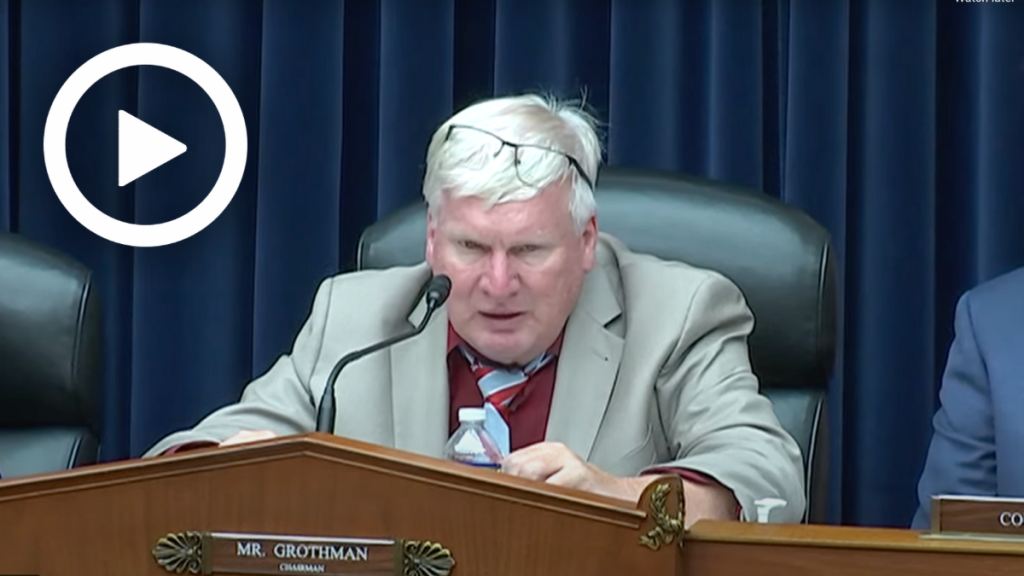Grothman: Biden Administration has Mishandled Negotiations and Actions with Dangerous Iranian Regime
WASHINGTON –Subcommittee on National Security, the Border, and Foreign Affairs Chairman Glenn Grothman (R-Wis.) delivered opening remarks at a subcommittee hearing titled “A Dangerous Strategy: Examining the Biden Administration’s Failures on Iran.”In his opening statement, Subcommittee Chairman Grothman stressed that the Biden Administration has failed to be transparent with Congress and the American people on negotiations and actions with the Iranian regime. He continued by blasting the Biden Administration for issuing a sanctions waiver as part of its prisoner swap with Iran on the anniversary of September 11th, which will free up that $6 billion for the world’s largest state sponsor of terrorism. Subcommittee Chairman Grothman concluded by emphasizing the U.S. must counter the destruction and terror that Iran supports and funds around the world and that the United States cannot rely on incompetent or compromised officials to achieve our goals.
Below are Subcommittee Chairman Grothman’s remarks as prepared for delivery.
Good morning, and welcome to the Subcommittee on National Security, the Border, and Foreign Affairs’ hearing: A Dangerous Strategy, Examining the Biden Administration’s Failures on Iran.
Today, we are examining the Biden administration’s lack of transparency on Iran, the regime’s nuclear program, American hostage negotiations, and the circumstances surrounding the dismissal of the Special Envoy on Iran, Robert Malley.
Signed under the Obama administration, the Joint Comprehensive Plan of Action, or JCPOA, was touted by the left as the fix-all to the Iranian nuclear dilemma.
In reality, it did little to reign in the Iranian regime while rewarding it with literal pallets of cash.
In May of 2018, the last Administration withdrew the United States from the JCPOA, due to Iran’s continued bolstering of its ballistic missile program and its funding of terrorist groups around the globe.
Then candidate-Biden pledged that he would return the United States to the JCPOA but has since failed to uphold that pledge.
Instead, the Administration has negotiated in secret, and has failed to be transparent with Congress or the American people on negotiations with the Iranian regime.
This lack of transparency is occurring despite the Iran Nuclear Agreement Review Act’s expansive disclosure requirements.
In March 2023, the International Atomic Energy Agency detected enriched uranium particles at 83.7 percent, prompting great concern as weapons grade uranium is enriched at 90 percent or higher.
In addition to its nuclear program, Iran continues work to perfect its ballistic missile program. In May of this year, Iran unveiled its 4th generation liquid fuel ballistic missile, which can carry a 1,500-kilogram warhead around 1,200 miles.
Iran’s Revolutionary Guard Corps, or the IRGC, continues to provide arms, training, and financial support to militias and terrorist organizations in Bahrain, Iraq, Lebanon, Palestine, Syria, and Yemen.
In 2020, the State Department estimated that the IRGC provides the terrorist organization Hezbollah $700 million a year in assistance. In 2019, the Trump administration labeled the IRGC a terrorist organization.
The IRGC is also known to have funded groups that have used car-side bombs and missile barrages against U.S. forces stationed in the region. Since President Biden took office, Iran or its proxies have attacked U.S. forces in the Middle East almost 100 times.
Last month, the White House announced that it was negotiating with Iran to permit the unfreezing of $6 billion in sanctioned Iranian assets in exchange for the release of five detained Americans.
And on Monday, as our nation remembered the horror of the September 11th attacks, the administration issued a sanctions waiver, freeing up that $6 billion for the world’s largest state sponsor of terrorism.
The White House assured the public that the $6 billion could only be used for humanitarian purposes but Iran has reiterated its position that the Iranian regime will decide how to spend the money.
While I believe that it is imperative that we bring home every wrongfully detained American citizen abroad, it is also crucial we ensure that the increase in ransom payments made by the U.S. Government does not incentivize hostile nations like Iran to continue to kidnap American citizens.
It is also vital that we ensure that these large payoffs, in this case $1.5 billion more than the cost of the USS Ronald Reagan aircraft carrier, are not used to fund the IRGC and the proxy terrorist organizations it supports.
Finally, the circumstances surrounding the dismissal of Robert Malley, the Biden administration’s first Special Envoy for Iran, are highly unusual.
Malley’s career has been marked by a long history of appeasement toward adversaries of the United States in the Middle East.
In 2008, while serving in the Obama administration, Malley was forced to resign after he was found to have repeatedly met with the terrorist organization Hamas.
In 2019 Malley also met with Iran’s then-Foreign Minister to undermine President Trump’s maximum pressure campaign against Iran.
Most recently, Malley was increasingly absent from his official duties and repeatedly ignored Congressional briefing requests.
The White House subsequently defended Malley stating that he was taking personal leave, but it has since come to light that the State Department revoked Malley’s security clearance and placed him on unpaid leave in June.
The United States must counter the destruction and terror that Iran supports and funds around the world. We cannot rely on incompetent or compromised officials to achieve our goals.
I look forward to hearing from each of our expert witnesses today on the reality of the dangers we face from the Iranian regime and clearheaded solutions.
